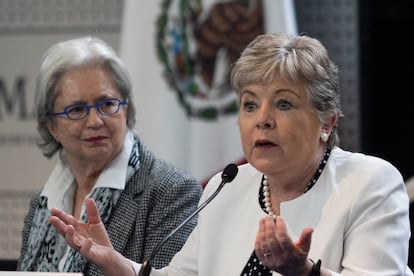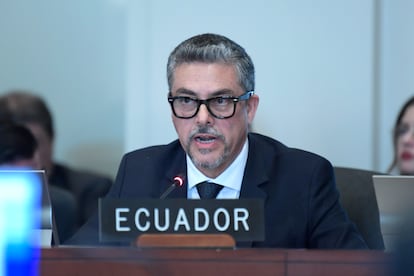Mexico seeks regional support for ICJ lawsuit against Ecuador over Jorge Glas embassy raid
Daniel Noboa’s government described Jorge Glas’ asylum at Mexican legation as a provocation and justified the assault as a necessary step to prevent impunity

Latin American diplomacy has been ramped up over the crisis between Mexico and Ecuador. Both the Community of Latin American and Caribbean States (CELAC) and the Organization of American States (OAS) met Tuesday in extraordinary sessions to address Ecuador’s raid on the Mexican Embassy in Quito last Friday. In the first session, Mexican Foreign Minister Alicia Bárcena thanked the countries of the region for their support and asked for backing on a lawsuit against Ecuador in the International Court of Justice, which will be presented in the coming days. A meeting with all the heads of state, including Mexican President Andrés Manuel López Obrador and Brazilian President Lula da Silva, is also being discussed. The government of Ecuadorian President Daniel Noboa has responded to the accusations, describing Mexico’s attitude as a provocation and justifying the assault on the Mexican embassy as a necessary step to avoid impunity.
“Today, CELAC has a huge responsibility, and the obligation to demonstrate to the international community that breaches of international law are unacceptable, but above all that they carry consequences,” Bárcena said in her speech at the extraordinary session. “It is time to see a united CELAC.” Ecuadorian Foreign Minister Gabriela Sommerfeld also participated in the meeting and justified the actions of Noboa’s administration, stating that the asylum granted to former vice-president Jorge Glas was a provocation to her country. As a sign of strength, López Obrador on Tuesday afternoon released the content of a call he had held with Lula da Silva in which the Brazilian president expressed his complete solidarity. With Da Silva’s support, the Mexican government will seek to take the matter “to the highest level” of regional diplomacy, Bárcena added.
After several weeks of escalating bilateral tensions, Ecuadorian police raided Mexico’s diplomatic headquarters without permission, mistreated and pointed guns at Mexican officials, and forcibly removed Glas, who has been convicted in two corruption cases. The attack was condemned by many countries around the world. Embassies are a sacred place in international diplomacy and inviolable territory for local authorities. “What happened is unprecedented in the history of the region; neither in the worst moments, nor in the darkest moments, has there been such a clear violation of the most basic norms of diplomatic coexistence,” added Bárcena. “A very dangerous threshold was crossed in this authoritarian act.”

The Ecuadorian authorities stated from the outset that the assault on the embassy was ordered due to the suspicion that Glas was attempting to flee illegally while waiting for a safe-conduct from Noboa’s government to leave Ecuador for Mexico City. Mexico has rejected this justification, and on Tuesday López Obrador released a video in which a dozen Ecuadorian agents are seen entering the diplomatic headquarters, breaking down the door and dragging Glas out while pointing a gun and throwing the legation chief to the floor. “The Ecuadorian security forces attacked the physical integrity and dignity of the head of the Foreign Ministry of our Embassy, Roberto Canseco, by pointing a gun at him, harassing him, and subduing him on more than one occasion,” added Bárcena.
Bárcena also responded to Ecuador’s accusations that Mexico first violated the Vienna Convention by granting asylum to a person convicted of corruption. “Faced with Ecuador’s arguments that Mexico would have abused diplomatic immunities by sheltering a common criminal, I reiterate that Mexico strongly rejects this position,” she said. “It is false that we were planning an imminent escape. We were not going to proceed in that way.” The foreign minister explained that Mexico had “at all times” maintained dialogue in good faith with Ecuador and that they had “thoroughly” examined the information passed to them by the Ecuadorian authorities on the judicial case against the former vice-president. “The behavior of the government of Ecuador was disproportionate and cannot set any precedent.”
Ecuador’s Vice Minister of Human Mobility Alejandro Dávalos said Tuesday at the OAS session in Washington that the actions of his country were a necessary step to avoid “impunity” and prevent the former high-ranking official from “evading justice.” In the extraordinary session of the permanent council, Dávalos, on behalf of Foreign Minister Sommerfeld, read a broad argument in which he assured that the raid had been justified as the only way to “comply with the sentences” against Glas for illicit association to commit a crime and bribery, the latter carrying a sentence of eight years handed down in 2020. The vice minister accused Mexico of having “promoted impunity” by granting diplomatic asylum to the former vice president in its legation.
By offering Glas sanctuary, Mexico “undermined these aspects by allowing him to remain in the premises, preventing the functioning of the Ecuadorian judicial system” which, Dávalos emphasized, had convicted Glas in trials that complied with all guarantees. Mexico’s ambassador to the OAS, Luz Elena Baños, was not present at the meeting.
“Despite the fact that Mr. Glas was subject to enforceable sentences for common crimes, the Mexican embassy received him as a guest and later he was considered an asylum seeker, thus managing to evade justice,” Dávalos stressed in his speech. The former vice-president, he added, represented a flight risk. Mexico, declared Dávalos, “has emphasized the importance and respect it gives to the institution of asylum. However, its attitude undermines and denaturalizes the figure of diplomatic asylum by granting it to a convicted fugitive from Ecuadorian justice.”
Sign up for our weekly newsletter to get more English-language news coverage from EL PAÍS USA Edition
Tu suscripción se está usando en otro dispositivo
¿Quieres añadir otro usuario a tu suscripción?
Si continúas leyendo en este dispositivo, no se podrá leer en el otro.
FlechaTu suscripción se está usando en otro dispositivo y solo puedes acceder a EL PAÍS desde un dispositivo a la vez.
Si quieres compartir tu cuenta, cambia tu suscripción a la modalidad Premium, así podrás añadir otro usuario. Cada uno accederá con su propia cuenta de email, lo que os permitirá personalizar vuestra experiencia en EL PAÍS.
¿Tienes una suscripción de empresa? Accede aquí para contratar más cuentas.
En el caso de no saber quién está usando tu cuenta, te recomendamos cambiar tu contraseña aquí.
Si decides continuar compartiendo tu cuenta, este mensaje se mostrará en tu dispositivo y en el de la otra persona que está usando tu cuenta de forma indefinida, afectando a tu experiencia de lectura. Puedes consultar aquí los términos y condiciones de la suscripción digital.








































